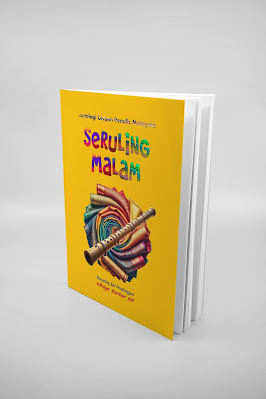Buku-buku saya diterbitkan hasil sokongan dan sumbangan ikhlas daripada rakan-rakan yang sama-sama mencintai bahan bacaan bermutu. Atas sebab itulah juga nama para penyumbang modal sosial (social capital) disenaraikan di dalam buku dan di blog. Saya mahu nama para penyumbang sentiasa diketahui, dikenang, dan dihargai para pembaca—pada masa sekarang dan masa depan.
Bagi projek penerbitan buku Siapa Bunuh Veer Singh?, nama para
penyumbang dikemas kini di sini sehingga 15 Mac 2026 (10:00 malam).
1. Selvarajah Murugesan
(Jenjarom, Selangor)
2. Sivapalan Selvadurai
(Kajang, Selangor)
3. Priya
Kulasagaran @ Priya K (Petaling Jaya, Selangor)
4. Prem Kanna a/l
Dorairaj (Rawang, Selangor)
5. Prabhawathy
Govindarajoo (Shah Alam, Selangor)
6. Devishi Prabha
Sankari (Shah Alam, Selangor)
7. Sivasankar Narayanan
(Setia Alam, Selangor)
8. Harveen Sankar
Sivasankar (Setia Alam, Selangor)
9.
10.
11.
12.
13. Amir Muhammad
(Petaling Jaya, Selangor)
14. Zaheer Zechariah (Bukit Jelutong, Selangor)
15.
16.
17.
18.
19.
20.
21. Django King @ Hafiz Hisan (Ipoh, Perak)
22. Joey J (Kuching, Sarawak)
23. Sasitharan SG (Ayer
Itam, Pulau Pinang)
24. Jayaprakash
Jayachandran (Senawang, Negeri Sembilan)
25. Ruthira K. Surasan (Klang, Selangor)
26. Norazli bin Ramlis (Batang Kali, Selangor)
27. Virochan Anyu Sri
(Kuching, Sarawak)
28. Sri Bala Krishnan (Kuching, Sarawak)
29. Devy (Bayan Lepas, Pulau Pinang)
30. Halini Paramanathan (Kepong, Kuala Lumpur)
31. Dr. Arun Tharma
Iswara (Sydney, Australia)
32. Vickneswaran Achuthan (Ayer Itam, Pulau Pinang)
33. Kannan a/l Perumal (Kajang, Selangor)
34. Koh Yok Hwa (Kepong, Kuala Lumpur)
35. Kalaiarasan a/l Murugasu (Semenyih, Selangor)
36. Mohd Izwan bin Mohd Ali (Jasin, Melaka)
37. Dr. Swagata Sinha Roy
(Kajang, Selangor)
38. Kamalah Suppiah
(Gelugor, Pulau Pinang)
39. Murugan Ramachandran (Menglembu,
Perak)
40.
41.
42.
43.
44. Mahamad Fauzi Ab Razak (Shah Alam, Selangor)
45. Mannar Mannan Maruthai (Petaling Jaya, Selangor)
46. Saravanan Selanduray (Puchong, Selangor)
47. Nurrul Faiz (Klang,
Selangor)
48. Ilanila Nagathisen
(Teluk Kumbar, Pulau Pinang)
49. PL Weng (Kuala
Lumpur)
50. Hendry Rao a/l Francis
(Seremban, Negeri Sembilan)
51. Visvanathan (Seremban, Negeri Sembilan)
52. Nizha Periaswamy (Shah Alam, Selangor)
53. Dr. Florence Kuek (Ara Damansara, Selangor)
54. Irene Tan Ai Ling (Puchong, Selangor)
55. Nalina Devi a/p Applanaidu
(Sungai Petani, Kedah)
56.
57. Evelyn C (Shah Alam,
Selangor)
58. Son Yeo Choy (Puchong, Selangor)
59. Mr. B (Brickfields, Kuala Lumpur)
60. Malarkodee a/p
Muniandy (Seri Kembangan, Selangor)
61.
62. Aathan Natchenthan Murali (Pusing, Perak)
63.
64.
65. Barathi (Puchong, Selangor)
66.
67.
68.
69.
70.
Senarai
penyumbang modal sosial bagi projek buku sebelum ini — [klik di sini]. Semoga para penyumbang modal
sosial sentiasa dirahmati Tuhan dan
dimurahkan rezeki.











